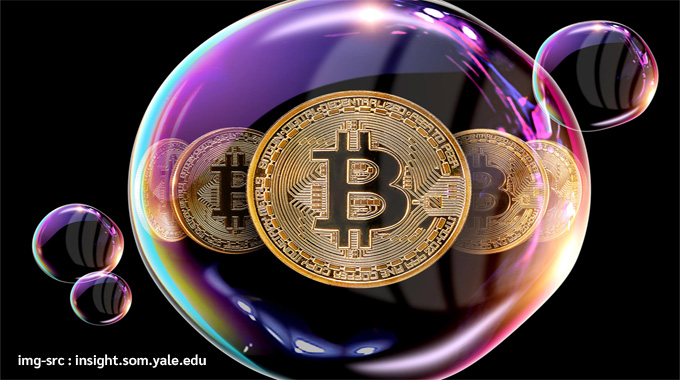An economic bubble is a situation where the price of a good rises far above the item’s actual value. It happens as a result of a surge in asset prices that is caused by vivacious market behavior.
According to Investopedia, during a bubble, assets are traded at a price, or within a price range beyond the asset’s actual value i.e. the price does not align with the fundamentals of the asset.
Bitcoin is the most popular type of cryptocurrency. Cryptocurrency uses blockchain technology for protection.
Bitcoin has a limited supply that will not exceed 21 million bitcoins, at least in this lifetime. Such scarcity is one component of creating value.
If you’re interested in investing in bitcoin or any other cryptocurrency in the market, US-Reviews has a few recommendations that you may find useful.
If you’re not satisfied with your options, you will find some online cryptocurrency companies reviews to help you narrow down your choices to the most reliable companies.
The Value of Bitcoin
In September last year, Bitcoin made it out of the bear market that it had been subjected to since the explosion of the 2018 bubble.
Ever since the incident, bitcoin’s value has been on a rollercoaster ride since the beginning of the year.
Bitcoin has seen a growth of about 700% since the beginning of 2020. Financial analysts suggest that a sharp surge in price is a characteristic of bubbles where the prices come back down even faster than they climbed.
Traditionally, a bubble pops and then disappears instead of continuing to bubble. Whenever a Bitcoin bubble bursts, another grows back to replace it.
This frequency makes the Bitcoin narrative somewhat atypical relative to the great bubbles of the past such as the dotcom bubble of the late 90s or the housing prices before 2008.
Rather than conclude that each spike and fall is a discrete bubble, it is better to note that Bitcoin’s market volatility is simply a necessary evil of the price discovery in a new asset class.
Consider the fluctuations as part of a not-so-random process that will eventually give way to Bitcoin to be more stable, and ultimately, legitimate.
Therefore Bitcoin is NOT a bubble.
Why You Should Trade In Bitcoin
- Digital money is becoming the norm: The COVID-19 pandemic brought about a dramatic increase in online shopping and cashless payments. It has also accelerated interest in digital money. Cryptocurrencies are also becoming more usable through so-called “stable coins” with values pegged to central bank currencies as well as improved wallets making it easier to swap tokens.
- Its technology is maturing: Ethereum, a type of cryptocurrency, has embarked on a major technical upgrade (called Eth2) transitioning the blockchain to a “proof-of-stake” mechanism that does not make use of energy-intensive computing processes. This should ease the concerns of those holding back on environmental grounds and allow it to scale up.
- Institutions recognize its value: As Rick Rieder, chief executive of BlackRock, the world’s largest investment funds manager (more than US$7.4 trillion in assets under management) declared, “cryptocurrency is here to stay”.













